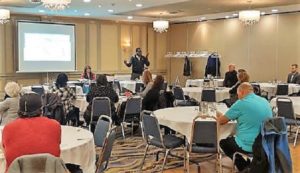Fiscally speaking

By Kirk Titmuss
NIPISSING FIRST NATION—Staff from the Restoration of Jurisdiction Department at the Anishinabek Nation conducted the first of a series of fiscal workshops slated for Sudbury, Sault Ste. Marie, Toronto and Thunder Bay. The kick-off meeting, which was held at the Holiday Inn in Sudbury on December 2, was designed to inform attending band managers and financial officers from the Anishinabek Nation’s four regions about the financial benefits built into the pending Anishinabek Nation Governance Agreement (ANGA).
The ANGA is an agreement between Canada and the member Anishinabek First Nations that recognizes Anishinabek self-governance and removes them from governance-related aspects of the Indian Act. This recognition is supported by a governance funding package that will ensure the First Nations Governments are sufficiently funded to fulfill all responsibilities and powers set out in the ANGA. This includes funding to support the transition to self-government and ongoing funding in recognition of the greater responsibilities assumed in the operation and management of their governments.
Jide Afolabi, a legal and financial expert who previously worked with the government of Canada on the recently legislated Anishinabek Nation Education Agreement and is now lending his expertise to the ANGA, outlined the proposed funding process at length for the dozen First Nations representatives.
Afolabi emphasized the non-restrictive nature of the funding and how it would be delivered with no strings attached. He also indicated that under the ANGA, Canada’s governance programs can be replaced by Anishinabek programs, based on the choice of each First Nation.
“What do you as the citizens and leaders want this to look like?” he asked. “It’s actually you the people who are creating this.”
Many in attendance queried various aspects of the financial deal. Some expressed distrust with deals involving Canada. Participants wanted certainty that the agreement would not restrict access to other forms of funding, and questioned the potential for future conditions or limitations placed on the new flexible funding arrangements.
“The only thing conditional is that it will increase,” Afolabi responded.
A major concern voiced by several representatives was the impact that the ANGA funding might have on First Nations self-generated or own source revenue (OSR). Some questioned whether there would be a claw-back on the funding based on OSR amounts or limitations imposed upon how much OSR First Nations could raise.
Afolabi assured participants that there is currently an open-ended moratorium on OSR, since Canada is “retooling its fiscal policies”. That moratorium is applicable to the ANGA.
“First Nations have an inherent right to create their own revenue,” he explained. “While the moratorium is in place, the Government of Canada has committed to co-developing an own-source revenue policy alongside Indigenous Governments.”
A ratification vote for the ANGA is being planned for 2019.

